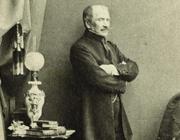
b. 1805, Haghig (Covasna) – d. 1876, Cluj. Politician and state man, lawyer and economist, patron of the arts.
After Mikó Imre's death, part of the personal library was donated to the Ardelean Museum by his family, and then into the collections of the University Library, which made it available to research and students.
Born into an old noble family, he spent his childhood in Ocna Mureş. He graduated from Bethlen College in Aiud, completing his law studies at Targu Mureş. After completing his studies, he became an official in the Transylvanian Government (Gubernium). In 1847 he was appointed president of the Transylvanian Treasury, acquiring the office of governor of Transylvania a year later. By order of the Vienna Government, from December 1848 to October 1849, he was detained in Olmutz. On his return to Transylvania, he found a country that was trying to recover from the revolution of 1848 and military conflicts. In these circumstances, he set out to reorganize the disintegrated Hungarian society because of the absolutist government in Vienna, considering that the reopening of dissolved institutions, as well as the establishment of new institutions, is a political priority for Transylvania. In carrying out these projects, his financial contributions were impressive, being called, for these reasons, "Széchenyi of Transylvania". Charisma and personality, as well as exceptional erudition, were the basis of his election, between 1853-1876, as president or general curator of cultural and scientific institutions in Transylvania: the Society of the Transylvanian Museum, the Hungarian Society of Economics, the National Theatre of Cluj, the Reformed Diocese of Transylvania and the Bethlen College of Aiud. He was briefly re-elected governor of Transylvania (in 1861), then Minister of Transport (1867-1868). He also became president of the Hungarian History Society (1867-1876) and deputy of Cluj (1866-1876) in the Hungarian Parliament.
As the official leader of the said institutions, Count Imre Mikó left a vast correspondence, including a series of speeches, considered today authentic sources for studying the history of Transylvania institutions. The establishment of the Transylvanian Museum Society, supported by the Hungarian community in Transylvania, was the most important achievement of Count Imre Mikó. The society has carried out a prominent scientific activity, performing both museum and academic functions, thus also contributing to the foundation of a heritage of historical documents and natural sciences. In 1872, the Library of the Transylvanian Museum, comprising more than 30,000 volumes, was made available to the University Library for study and research.


